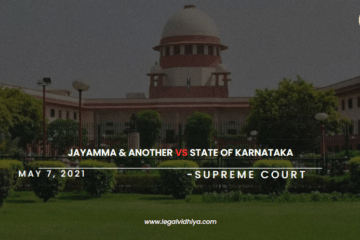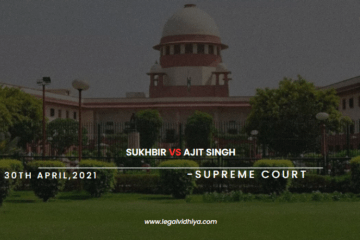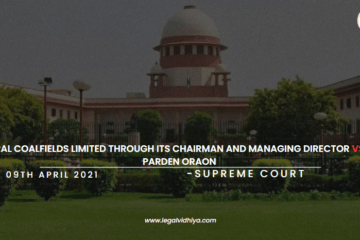
KARAN SINGH AND ANR. VS MUSAMMAT TETAR KUER AND ORS. ON 23 APRIL, 1937
Equivalent Citations: | A.I.R. 1937 Pat 435 |
Date of Judgement: | 23rd April 1937 |
Court: | Patna High Court |
Case No.: | Appeal No. 50 of 1934 |
Appellant: | Karan Singh And Anr. |
Respondent: | Musammat Tetar Kuer and Ors. |
Bench: | Courtney-Terrell, James, Varma |
Statutes Referred: | The Limitation Act, 1963 – Section 7 & Section 8The Constitution of India 1949 – Article 44 |
Other case cited: | Ponnamma Pillai Indira Pillai and … vs Padmanabhan Channar Kesavan … on 1 July, 1968Netramani Debi vs Lakhminarayan Kar and Ors. on 2 February, 1959Jawahir Singh vs Udai Parkash on 4 December, 1925Asutosh Ghose And Ans. vs Sashi Moman Roy and Ors. on 18 June, 1928Kamta Rai v. Jadura j Kunwari AIR 1931 All 398 |
FACTS OF THE CASE
- In this case the plaintiffs were two brothers Karan Singh and Charan Singh. Their father was Mahali Singh, mother’s name was Musammat Hiran Kuer who was the respondent in the case and the cousins Shankar and Sukhnath Singh. So, the Plaintiffs- Karan Singh and Charan Singh filed a suit seeking confirmation of possession or recovery of possession over 8 annas of Mauza Kurpani. This appeal arises out of a captivating legal battle. They claimed that their mother, Musammat Hiran Kuer, had sold their 8 annas share in the property to Sheoshahkar Sahu on 12th June 1914, which they sought to set aside. The plaintiffs alleged that the sale was not for any legal necessity and therefore not binding upon them. In addition to seeking to invalidate the sale, they also sought redemption of a zarpeshgi and partition of their share in the mauza, along with mesne profits.
- The plaintiffs contended that Mauza Kurpani, consisting of 8 annas belonging to their father, Mahali Singh, and another 8 annas owned by Shankar and Sukhnath Singh, was subject to a series of unfortunate events. They highlighted the sale of Shankar Singh’s 8 annas share to Sheoshahkar Sahu, which was subsequently assigned to Sheobhajan Sahu. Additionally, they raised concerns over their mother’s sale of their 8 annas share to Sheoshahkar Sahu, alleging deception and collusion by Sukhnath and Shankar’s son, Jai Singh.
- On the other hand, Defendants Nos. 1 and 2, the purchasers of the property, vehemently contested the suit and argued that the sale was valid and for legal necessity. They asserted that Musammat Hiran Kuer sold the property for full consideration, denying any fraud or misrepresentation. They argued that the sale was executed to discharge an antecedent debt and thus fulfilled the requirements of legal necessity. The defendants emphasized that Karan Singh had attained majority long ago and had previously litigated against them without success. Furthermore, they contended that the suit was barred by limitation.
- The trial court and the Judicial Commissioner of Chota Nagpur dismissed the suit, finding that the plaintiffs failed to prove legal necessity for setting aside the sale.
ISSUES:
- Is the suit barred by limitation?
- Was the sale-deed executed by defendant No. 3 obtained through fraud and misrepresentation and without consideration?
- Was there any legal necessity for the transfer?
ARGUMENTS:
Plaintiffs’ Arguments:
- The plaintiffs argue that the sale was not for any legal necessity and therefore not binding upon them as minors.
- They claim that their mother was deceived by Sheoshankar Sahu, who colluded with other family members to fraudulently obtain the sale.
- The plaintiffs contend that they attempted to redeem their share of the zarpeshgi and requested a partition of the property, but defendants Nos. 1 and 2 refused to cooperate.
Defendants’ Arguments:
- The defendants assert that Musammat Hiran Kuer sold the property for full consideration and there was no fraud or misrepresentation.
- They argue that the sale was made to pay off an antecedent debt and was for legal necessity.
- The defendants claim that plaintiff No. 1, Karan Singh, had attained majority long ago and had previously fought unsuccessful suits against the defendants regarding some of the lands.
- They contend that the suit is barred by limitation.
JUDGEMENT:
- Upon careful deliberation, the court embarked on a comprehensive analysis of the case. It weighed the arguments presented by both parties, examined the evidence, and scrutinized the relevant legal provisions. In doing so, the court arrived at decisive findings that shaped the final judgment.
- The court initially addressed the issue of whether the suit was barred by limitation. It acknowledged the defendants’ argument that the plaintiffs failed to establish that Karan Singh attained majority within the requisite three-year period prior to filing the suit. While this finding favoured the defendants, the court did not stop there.
- Delving deeper into the intricacies of joint Hindu family law and the rights of co-parceners, the court considered the plaintiffs’ counter-arguments. It recognized the principle that every co-parcener had an individual right to challenge the acts of their guardian or family manager, even if it involved joint causes of action. In light of this principle, the court questioned whether an elder brother, as the manager of the family, could unilaterally relinquish the right to sue without the concurrence of the minor brothers.
- The court grappled with the interpretation of Section 7 of the Limitation Act of 1908, which governed joint rights to sue. [Kamta Rai v. Jadura j Kunwari AIR 1931 All 398] After a thorough examination, the court concluded that if the elder brother could not validly discharge the claim without the concurrence of the minor brothers, then the suit would not be barred by limitation. This finding significantly favored the plaintiffs and bolstered their case.
- Moving on to the second issue, the court addressed the validity of the sale-deed. It carefully considered the allegations of fraud, misrepresentation, and lack of consideration put forth by the plaintiffs. The defendants vehemently denied these allegations, maintaining that the sale was executed for full consideration and was free from any fraudulent practices.
- After a meticulous examination of the evidence and arguments presented by both parties, the court made a critical determination. It found that the plaintiffs had not successfully proven that the sale-deed was obtained through fraud and misrepresentation and lacked consideration. This finding worked in favour of the defendants, strengthening their position.
- In light of these findings, the court delivered its final judgment. It upheld the lower court’s decision to dismiss the suit, affirming that the plaintiffs had failed to establish Karan Singh’s majority within the prescribed time frame and that there was no legal necessity for the sale. As a result, the plaintiffs’ claims for possession, redemption of zarpeshgi, partition of the property, and mesne profits were denied.
- The court’s judgment, informed by a comprehensive analysis of the facts, legal arguments, and relevant provisions, showcased the delicate balance between individual rights and joint interests within a family. It underscored the complexity of family law and the necessity for valid discharge in cases of property alienation, ultimately resolving the captivating legal battle between the plaintiffs and defendants.
CONCLUSION
In a captivating legal saga, the plaintiffs, Karan Singh and Charan Singh, embarked on a valiant quest for justice, aiming to reclaim their rightful possession over 8 annas of Mauza Kurpani, which had been entangled in a disputed sale. The plaintiffs vehemently contended that the sale, orchestrated in 1914 by their mother, Musammat Hiran Kuer, to Sheoshahkar Sahu, was devoid of any legal necessity and thus non-binding. Their journey further entailed a pursuit for redemption of a zarpeshgi, partition of their share in the mauza, and the restitution of mesne profits. On the opposing side, Defendants Nos. 1 and 2 staunchly contested the suit, asserting that the sale was valid, executed for legal necessity and full consideration. The court, after diligent examination of the evidence and intricate legal interpretations, delivered its resolute judgment, deeming the suit barred by limitation due to the plaintiffs’ failure to establish that Karan Singh had attained majority within the requisite timeframe. Despite acknowledging Karan Singh as the managing member of the family and dismissing the notion of legal necessity for the sale, the court upheld the lower court’s decision, denying the plaintiffs’ claims for possession, redemption, partition, and mesne profits.
REFERENCES
https://www.courtkutchehry.com/
This Article is written by Zoya Hashmi a law student of Integral University Lucknow, 6th Semester, Intern at Legal Vidhiya.




0 Comments